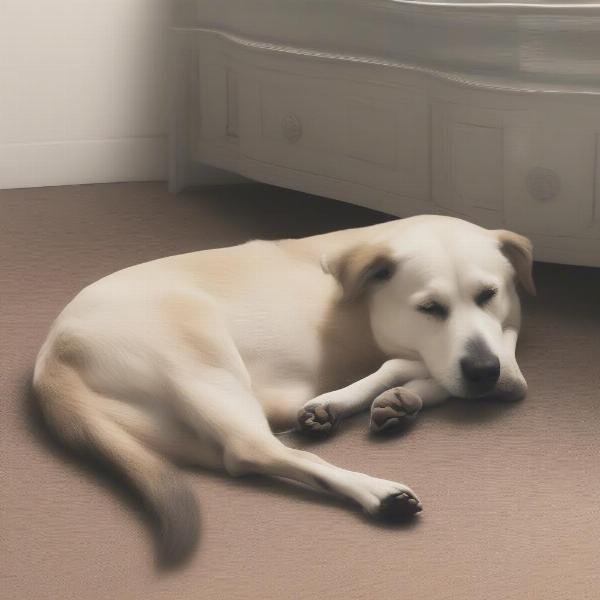If your dog ate a condom, you’re likely feeling panicked. This is a serious situation that requires immediate attention. A swallowed condom can cause a life-threatening blockage in your dog’s digestive system. This article will guide you through what to do if your dog eats a condom, from recognizing the signs to seeking veterinary care and preventative measures.
What are the Dangers of a Dog Eating a Condom?
The biggest risk when a dog eats a condom is a gastrointestinal obstruction. The condom, especially latex ones, can’t be digested and can get stuck in your dog’s stomach or intestines. This blockage can prevent food and water from passing through, leading to severe complications like vomiting, dehydration, abdominal pain, and even rupture of the intestines.
If the condom is flavored or lubricated, the chemicals can also cause further irritation or even toxicity. It’s crucial to act fast if you suspect your dog has ingested a condom.
Signs Your Dog Has Eaten a Condom
The signs that your dog has ingested a condom can vary depending on the size of your dog and the type of condom. Some common signs include:
- Vomiting
- Loss of appetite
- Lethargy
- Abdominal pain or distension
- Straining to defecate
- Changes in bowel movements (diarrhea or constipation)
- Whining or other signs of discomfort
 Dog showing signs of discomfort after eating a condom
Dog showing signs of discomfort after eating a condom
If you notice any of these signs, contact your veterinarian immediately.
What to Do If Your Dog Ate a Condom
If you see your dog eat a condom or suspect they have, here’s what you should do:
- Do not induce vomiting. Unless specifically instructed by your vet, do not try to make your dog vomit. The condom could become lodged in the esophagus, making the situation worse.
- Contact your veterinarian immediately. Time is of the essence. Explain what happened and provide details about the type of condom and when you think your dog ate it.
- Follow your veterinarian’s instructions carefully. They may advise you to bring your dog in for an examination and possible X-rays to confirm the location of the condom. Treatment options may include inducing vomiting (if appropriate), endoscopic removal, or surgery.
Preventing Your Dog from Eating a Condom
Prevention is always better than cure. Here are some steps you can take to prevent your dog from getting their paws on a condom:
- Keep condoms out of reach. Store them in drawers, cabinets, or other secure locations where your dog can’t access them.
- Dispose of condoms responsibly. Wrap used condoms securely and place them in a trash can with a lid.
- Supervise your dog. Be mindful of your dog’s whereabouts and what they’re getting into, especially in areas where condoms might be present.
Conclusion
A dog eating a condom is a serious matter that requires immediate veterinary attention. Recognizing the signs and acting quickly can save your dog’s life. By taking preventative measures, you can significantly reduce the risk of this happening.
FAQ
- Can my dog pass a condom naturally? It’s unlikely. Condoms can easily cause blockages in a dog’s digestive tract.
- What if I’m not sure if my dog ate a condom? If you suspect your dog ate a condom, it’s always best to err on the side of caution and contact your veterinarian.
- How much will treatment cost? The cost of treatment will vary depending on the diagnostic tests and procedures required.
- Can a flavored condom harm my dog? Yes, the chemicals in flavored condoms can irritate the digestive system and potentially cause toxicity.
- How long does it take for a condom to cause a blockage? This varies, but symptoms can appear within a few hours to several days.
ILM Dog is a leading online resource for dog owners worldwide, providing expert advice on all aspects of dog care, from breed selection and health to training, nutrition, and grooming. We are committed to providing accurate, practical, and up-to-date information to help you give your furry friend the best possible care. For further advice or to connect with our team of experts, please contact us via email at [email protected] or call us at +44 20-3965-8624. Visit ILM Dog for more information on dog health and well-being.